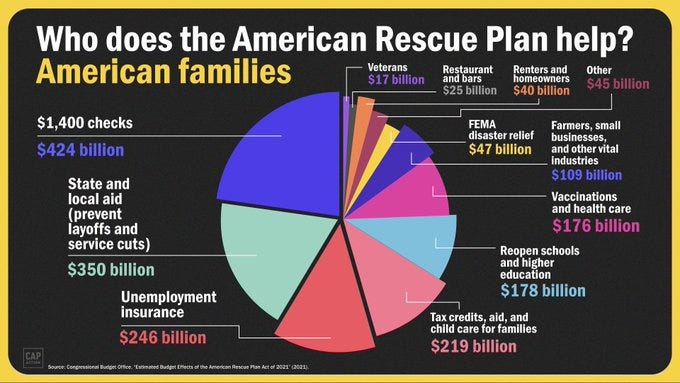The Real Fight on the American Rescue Plan is Yet to Come
Biden can’t repeat Obama’s failure to explain to Americans how massive government interventions help them directly
As Congress goes through the final back-and-forth on a third stimulus package ahead of what will almost certainly be a party-line vote, the Biden administration needs to lay the groundwork for an extensive public education campaign about the substance of the bill and how it affects working Americans directly.
So far, Biden has won the public debate on “going big” versus the GOP’s offer of little-to-nothing or outright opposition to any new stimulus. Voters across party lines strongly support the $1.9 trillion American Rescue Plan to bolster unemployment, fund vaccinations, provide direct cash relief to families, extend housing and child care assistance, help veterans, and support restaurants, bars, and small businesses, even if Republican politicians do not.
But the rubber will hit the road several months from now when people have forgotten the legislative fight and are evaluating the national picture and their own family’s economic situation. Voters will be assessing their leaders’ actions along the following lines: Is the virus under control? Are vaccines available to everyone? Do we have plan to get out of lockdowns? Are schools opening? Is the economy growing? Are people finding jobs? Do I have enough money for housing, food, utilities, education, and health care?
Democrats cannot assume that even if the answers to these questions are positive—meaning hopefully that the pandemic is receding and the economy is on the upswing—that people will give them credit for their actions or look favorably upon the outlay of large sums of federal money. Particularly in the face of constant right-wing agitation about liberal overreach, wasted spending, state bailouts, and layabouts on the dole.
The nightmare scenario politically for team Biden would be a repeat of the mixed public reaction to Obama’s mostly successful stimulus plan in 2009, a plan credited with helping to bring an end to the Great Recession and paving the way for longer term growth. Although America’s economy needed more time to fully recover after the 2009 stimulus, on the whole most analysts and economists believe that the plan did a world of good. As the New York Times stated in 2014:
The stimulus could have done more good had it been bigger and more carefully constructed. But put simply, it prevented a second recession that could have turned into a depression. It created or saved an average of 1.6 million jobs a year for four years. It raised the nation’s economic output by 2 to 3 percent from 2009 to 2011. It prevented a significant increase in poverty — without it, 5.3 million additional people would have become poor in 2010.
So, why was public support not as robust as it could have been for the 2009 stimulus? Because of repeated distortions and inaccuracies by opponents (on both the left but more from the right) about a “failed stimulus” and “where are the jobs?” with little-to-no response or effective countermeasures from the Obama administration.
The situation is far different now so it’s not clear this will be repeated, especially since Biden seems quite aware of this possibility given his primary role in overseeing the 2009 stimulus as Obama’s Vice President. (Biden even counseled Obama to boast more about getting money directly into people’s pockets, a la Trump signing the first round of stimulus checks, but was overruled by the “nerds” according to Ron Klain).
Likewise, Republicans already backed two massive rounds of stimulus under Trump so their cries about government spending don’t hold much water given their own positions just a few short months ago. And with 10 million people still out of work and many people facing acute economic or health hardships, Americans are desperate for more action not less.
But Biden shouldn’t underestimate what a wall of GOP opposition and right-wing media criticism could do to public perceptions of the American Rescue Plan.
He will need to talk frankly and consistently with Americans about why they are spending this money, who it is helping, and how it’s laying the ground for immediate relief and longer term renewal post-pandemic. If things aren’t working, they will need to adjust to economic and public health conditions in real time and prove to voters that they are on top of matters and seeking the best solutions.
Wishful thinking will not be enough to win the political battle on this bill and the future of America’s economy. Play up the checks. Help unemployed workers find jobs or paid apprenticeships and feature their journeys to other Americans. Host some working moms on a White House Zoom talking about the importance of child care support. Go to some Scranton or Wilmington bars and yuck it up with patrons happy that their locals are back in business and sports are live again. Bring in governors and mayors to talk about how they are putting state and local funding to good use.
Biden is already doing a good job with some of this but should keep it up. As the President and his team well know, they will need to deliver on pandemic control and economic relief—and make sure that people understand what exactly was done to help bring it about.




